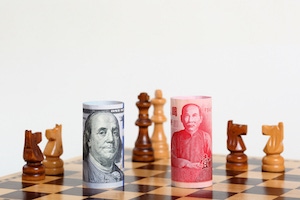View from China: Trump's impact on business will be positive, say U.S. and Chinese execs
What can U.S. business and industry expect when it comes to China? Plante Moran’s Lou Longo presents some key takeaways from Chinese business executives.
February 22, 2017

 While most government and mainstream media eyes seem to be on Russia, I’ve been wondering who’s thinking about China and what that country might be up to in the way of new strategies in the Trump era. Then a Plante Moran newsletter arrived in my in box featuring a trip report from China by Lou Longo, Partner, International Services for Plante Moran. Longo visited China last month and brought back these insights.
While most government and mainstream media eyes seem to be on Russia, I’ve been wondering who’s thinking about China and what that country might be up to in the way of new strategies in the Trump era. Then a Plante Moran newsletter arrived in my in box featuring a trip report from China by Lou Longo, Partner, International Services for Plante Moran. Longo visited China last month and brought back these insights.
“First and foremost, the outlook from both Chinese and U.S. executives regarding China-U.S. relations, and the impact on business in the Trump era, was positive,” said Longo. “Chinese officials say it will spur them to invest in the United States and Mexico. U.S. officials say their China-based operations are for China and Asian consumption, making them impervious to potential U.S. import duties. In light of all the discussion around international policy changes and what the future may hold, it’s important not to jump to conclusions and, instead, make thoughtful strategic decisions.”
Longo presented some of the key takeaways from Chinese business executives:
There’s an emphasis on growth outside China, looking at acquisitions of growth businesses or joint ventures to gain new technology.
Executives are feeling constant price pressure with wage inflation and more competition.
There’s significant investable capital. However, China central bank controls mean investments must fit the political priorities for outbound investments.
Executives need experts to help manage western investments.
Longo next presented what he heard from U.S. clients active in China:
There’s huge growth in industrial-support industries like tool and die supplies.
The automotive segment continues to increase technology innovation as a minimum ante to get RFPs (request for proposal).
Local competition is forcing down prices, even when local competitors can’t deliver technology. It’s important to stand firm on pricing and show the value of engineering and designing for manufacturability versus labor automation as a basis for cost savings.
China has been on a buying spree for the past couple of years, both in the United States and Europe, to the tune of $207 billion, much to the consternation of some in government. Despite pushback by German officials, citing the loss of German technology to the Chinese, Chinese home appliance maker Midea Group Co. acquired industrial robotics company Kuka AG. The Chinese are very active in the hospitality industry, purchasing a 25% stake in Hilton Worldwide Holdings Inc., and health firms.
Real estate has been an active area for China Oceanwide Holdings Group, which has made an offer to purchase Genworth Financial for $2.7 billion. A shareholder vote on the deal is scheduled for March 7, 2017, and the company is awaiting regulatory approvals; Genworth expects the deal to close by mid-year. Insurance is a new area for Oceanwide, according to reports on the deal, which said it has been mostly active in real estate. However, Genworth is a provider of mortgage insurance so that might be the connection.
A report last May noted that China spent $15 billion acquiring U.S. companies in 2015; 2016 saw the close of nearly 100 deals with an expected investment of approximately $33 billion, and both the number and the size of these deals (both M&A and private placement) increased. Chinese appliance maker Qingdao Haier bought GE’s appliance division for $5.4 billion.
However, China may be running into some headwinds. In addition to China’s central government cracking down on the types of firms it acquires to ensure they meet political and economic aims, as Longo pointed out, stronger obstacles may be coming from the U.S. government. In November, the backlash from China’s foray into the U.S. resulted in a government panel organized to ban China from buying American firms. A CNN Money report noted that the U.S.-China Economic and Security Review Commission warned of “a threat to national security” and wants the United States to block Chinese state-owned companies from carrying out takeovers in the country.
It would appear that China needs some oversight in its deal-brokering with U.S. companies, and already two deals failed: Fairchild Semiconductor “rebuffed a higher offer from Chinese state-backed buyers” in 2016 and agreed to a deal with an American rival. State-owned company Tsinghua Unigroup dropped its $3.8 billion investment bid in tech firm Western Digital last February “after U.S. regulators said they would investigate the deal on national security grounds,” said CNN Money.
Keeping an eye on Russia might not be a bad idea, but while we’re watching the front door and complaining about Russia’s interference in the recent election, China may be entering through the back door in a way that could have far worse consequences economically.
About the Author(s)
You May Also Like




